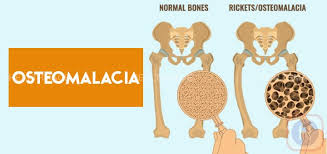Osteomalacia isn’t a rare condition – people all over the world suffer from this discomforting condition in which bones of an adult gets soft and cause problems like muscular weakness and pain.

In kids, the soft bones condition is known as Rickets and could be due to environmental, genetic or dietary factors. Mostly, it is because of low level of Vitamin D in the diet.
Difference between osteoporosis and osteomalacia:
Osteomalacia is confused with another condition called osteoporosis which is caused by deficiency of calcium. During this disorder, there is an abnormal loss of the bony tissue in the body and it is generally in women past their menopause stage. Osteomalacia, on the other hand, is due to severe deficiency of Vitamin D or abnormal metabolism of the same and it results in delicate porous bones. This condition is most likely to prevail in people who take low amount of Vitamin D in the diet and avoid the Sun altogether. Also, the aged and hospital bound people with almost no activity develop Osteomalacia. Children and even adults who don’t drink milk are high at risk too.
Symptoms:
There may be no symptoms in the early stages of the condition but as the situation worsens, the symptoms become clearer.The symptoms are;
- person with osteomalacia may have a hard time walking or develop a waddling gait.
- Bone pain, especially in your hips, is also a common symptom. A dull, aching pain can spread from your hips to the following places:
- lower back
- pelvis
- Legs
- Ribs
If you also have very low levels of calcium in your blood, you may have:
- irregular heart rhythms
- Numbness around your mouth
- numbness in your arms and legs
- spasms in your hands and feet.
Causes:
The major cause is vitamin D deficiency. Certain conditions can interfere with the absorption of vitamin D:
- Celiac disease can damage the lining of your intestines and prevent the absorption of key nutrients like vitamin D.
- Certain types of cancer can interfere with vitamin D processing.
- Kidney and liver disorders can affect the metabolism of vitamin D.
- A diet that doesn’t include phosphates can cause phosphate depletion, which can also lead to osteomalacia. And drugs to treat seizures — like phenytoin and phenobarbital — can also result in osteomalacia.






